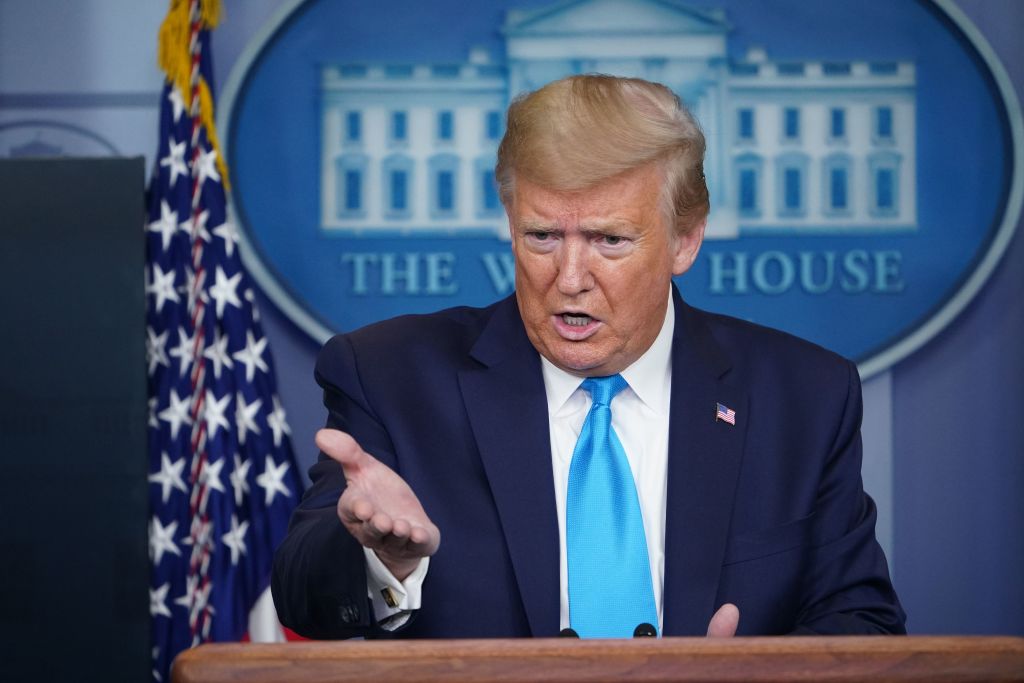Trump, who votes by mail, calls other mail-in voting 'very dangerous' and 'corrupt'


A free daily email with the biggest news stories of the day – and the best features from TheWeek.com
You are now subscribed
Your newsletter sign-up was successful
President Trump was asked at Tuesday's coronavirus press briefing about a push to expand mail-in voting in the 2020 election, and he did not appear receptive to the idea. "Mail ballots are a very dangerous thing for this country," Trump said, without evidence. "The mail ballots are corrupt, in my opinion. And they collect them, and they get people to go in and sign them, and then there's forgeries in many cases. It's a horrible thing." A reporter noted that Trump votes by mail in Florida, and the president said that's different "because I'm allowed to."
A North Carolina Republican operative was caught manipulating absentee ballots in 2018, but "there is no evidence that voting by mail results in significant fraud," says Matthew Harwood at New York University's Brennan Center for Justice. "As with in-person voting, the threat is infinitesimally small." In fact, he added, "much of the country now votes by mail," and it's the primary means of voting in California, Colorado, Oregon, and Washington. Ensuring "that anyone who has the right to vote can exercise that right as simply and safely as possible," especially during a pandemic, "shouldn't be a partisan issue but a patriotic duty," Harwood argues.
Ohio's Republican leaders pushed back their election and shifted most of the voting to mail-in ballots, but other Republican officeholders oppose anything bu in-person voting. Last month, Trump argued on Fox & Friends, again without evidence, that a push by House Democrats to allow vote-by-mail nationally would be ruinous for Republican candidates.
The Week
Escape your echo chamber. Get the facts behind the news, plus analysis from multiple perspectives.

Sign up for The Week's Free Newsletters
From our morning news briefing to a weekly Good News Newsletter, get the best of The Week delivered directly to your inbox.
From our morning news briefing to a weekly Good News Newsletter, get the best of The Week delivered directly to your inbox.
Georgia House Speaker David Ralston (R) made a similar argument last week, claiming that widespread use of absentee mail-in voting would "be extremely devastating to Republicans and conservatives in Georgia," because "every registered voter is going to get one of these" and "this will certainly drive up turnout."
A free daily email with the biggest news stories of the day – and the best features from TheWeek.com
Peter has worked as a news and culture writer and editor at The Week since the site's launch in 2008. He covers politics, world affairs, religion and cultural currents. His journalism career began as a copy editor at a financial newswire and has included editorial positions at The New York Times Magazine, Facts on File, and Oregon State University.
-
 Political cartoons for February 20
Political cartoons for February 20Cartoons Friday’s political cartoons include just the ice, winter games, and more
-
 Sepsis ‘breakthrough’: the world’s first targeted treatment?
Sepsis ‘breakthrough’: the world’s first targeted treatment?The Explainer New drug could reverse effects of sepsis, rather than trying to treat infection with antibiotics
-
 James Van Der Beek obituary: fresh-faced Dawson’s Creek star
James Van Der Beek obituary: fresh-faced Dawson’s Creek starIn The Spotlight Van Der Beek fronted one of the most successful teen dramas of the 90s – but his Dawson fame proved a double-edged sword
-
 NIH director Bhattacharya tapped as acting CDC head
NIH director Bhattacharya tapped as acting CDC headSpeed Read Jay Bhattacharya, a critic of the CDC’s Covid-19 response, will now lead the Centers for Disease Control and Prevention
-
 Witkoff and Kushner tackle Ukraine, Iran in Geneva
Witkoff and Kushner tackle Ukraine, Iran in GenevaSpeed Read Steve Witkoff and Jared Kushner held negotiations aimed at securing a nuclear deal with Iran and an end to Russia’s war in Ukraine
-
 Pentagon spokesperson forced out as DHS’s resigns
Pentagon spokesperson forced out as DHS’s resignsSpeed Read Senior military adviser Col. David Butler was fired by Pete Hegseth and Homeland Security spokesperson Tricia McLaughlin is resigning
-
 Judge orders Washington slavery exhibit restored
Judge orders Washington slavery exhibit restoredSpeed Read The Trump administration took down displays about slavery at the President’s House Site in Philadelphia
-
 Hyatt chair joins growing list of Epstein files losers
Hyatt chair joins growing list of Epstein files losersSpeed Read Thomas Pritzker stepped down as executive chair of the Hyatt Hotels Corporation over his ties with Jeffrey Epstein and Ghislaine Maxwell
-
 Judge blocks Hegseth from punishing Kelly over video
Judge blocks Hegseth from punishing Kelly over videoSpeed Read Defense Secretary Pete Hegseth pushed for the senator to be demoted over a video in which he reminds military officials they should refuse illegal orders
-
 Trump’s EPA kills legal basis for federal climate policy
Trump’s EPA kills legal basis for federal climate policySpeed Read The government’s authority to regulate several planet-warming pollutants has been repealed
-
 House votes to end Trump’s Canada tariffs
House votes to end Trump’s Canada tariffsSpeed Read Six Republicans joined with Democrats to repeal the president’s tariffs
